School News (159)
“Our students never cease to amaze me” – what it’s like working in a Catholic special needs school
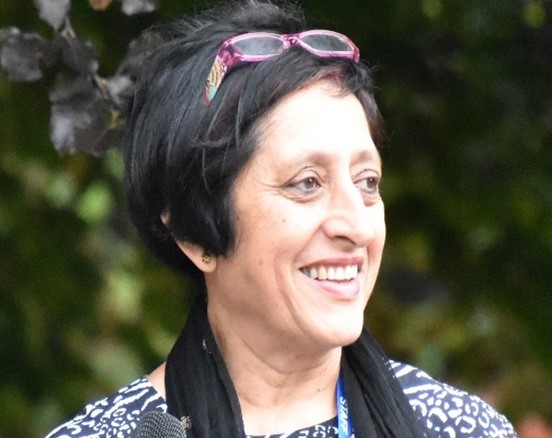 St Rose’s is a non-maintained, all through school in Stroud, Clifton Diocese, for students with special educational needs and disabilities. St Martin’s, a specialist college for those aged 19-25, is also based within the school grounds.
St Rose’s is a non-maintained, all through school in Stroud, Clifton Diocese, for students with special educational needs and disabilities. St Martin’s, a specialist college for those aged 19-25, is also based within the school grounds.
Over a hundred years ago a child with special needs, who could not be accommodated in a parish school, was left with the Dominican Sisters of St Rose’s Convent in Stroud. This led the Sisters to found St Rose’s School in 1912 – one of the very first special schools in the country.
In 1973 Mother Teresa, later canonised as Saint Teresa of Calcutta, heard about the children’s efforts to raise money for her work by holding a sponsored silence and she visited the school later that year. Today, students continue to raise money for charities.
St Rose’s is part of the parish of The Church of the Immaculate Conception, and has an accessible chapel on site. It was rated as ‘Outstanding’ in its latest Catholic Schools Inspectorate report. The school community is active in participating in Mass and liturgical celebrations, even though many are not Catholics, but understand the school’s heritage and value of its mission of the word of Christ and his teachings.
Long service
Sheila Talwar (pictured) is Principal of St Rose’s and St Martin’s and remembers volunteering to support St Rose’s students who travelled to a local school in Gloucester to use the swimming pool for hydrotherapy.
She said: “My first contact was while volunteering in the sixth form. Visiting St Rose’s as a school student I knew that I always wanted to work with children with disabilities.”
In January 1977 the forward-thinking Sisters took on Sheila as their first occupational therapy student, therapists being unusual at the time for special schools. After passing her exams Sheila returned as maternity cover, then on a more permanent basis as part of a job share.
As well as meeting students’ educational potential, enabling independence is a key part of the curriculum, teaching life skills such as nutrition, money management and time management, while wheelchair-accessible transport provides opportunities for trips to go shopping, ice skating, and more. Other activities students enjoy include horse riding, yoga, and swimming in the St Rose’s hydrotherapy pool.
In the past students enjoyed trips to Stoke Mandeville Stadium, birthplace of the Paralympic Games, to watch and participate in athletics events. Some have gone on to take part in national and international sporting competitions, including winning the London Mini Marathon wheelchair race.
Over the years St Rose’s has also taken students to pop concerts such as Meat Loaf, Madness, Janet Jackson, Michael Jackson and Musical Youth.
“In those days you could go backstage and meet musicians,” Sheila said, “we ended up playing piggy-back races with members of Musical Youth. We even met Stevie Wonder! More recently we have taken students to the WOMAD music festival and Cheltenham Jazz Festival which was a truly sensory experience.”
The Sisters soon asked Sheila to head the sixth form, which involved being responsible for a mix of therapy as well as education, and 15 years later Sheila took on the role of Head of Care.
St Martin’s
After sixth form, students used to leave St Rose’s and go on to other specialist, secular, colleges elsewhere. This led to the establishment just over a decade ago of St Martin’s, a residential college built on the school grounds which includes a work-related learning and careers programme, work experience placements, and mentoring.
Sheila said: “The thing for me is how important it is our students have the opportunities that mainstream children have. In the past, our young people have been able to go to university and have careers, such as qualifying as a social worker, or working for the BBC, and one student became a member of the Para Orchestra. These days our students have more complex needs, and our focus is on preparing them for their adult lives with as much independence as possible.”
Over the years she has seen many changes, such as a move away from students sleeping in dormitories and spending entire terms staying on site. Today, most residential students go home every fortnight, both to spend time with their families and to stay on the local authority’s radar for support services.
Changing needs
Students also have physical and health needs that are more challenging than in the past. Advances in medical technology have improved survival rates of preterm babies and children after severe trauma or illness.
Sheila said: “Our aim is to help each of our students recognise their unique worth in the eyes of God. The value our students bring to the world and the part they play in society cannot be measured, they really are quite amazing in what they achieve.
“Some students might have been to other schools where they don’t have speech and language technology, then come here and learn to communicate, to read and take a more active role in their lives, it’s just awe-inspiring.
“Our students never cease to amaze me. From learning to walk, to learning to use a communication aid, to running a tuck shop or learning phonics, the students are endlessly determined and creative in the ways they learn and develop. What our students do on a daily basis is phenomenal.”
Building the future
A fundraising campaign launched in 2019 by Eddie ‘The Eagle’ Edwards continued throughout all the restrictions of the pandemic, eventually raising £1.5million and culminating in the opening in May 2022 of Quentin House, a new residential block.
Students benefit from bespoke bedrooms and enjoy preparing food in an adapted kitchen. Short stays for day pupils additionally help to develop their independence.
The next stage of the campaign, titled St Rose’s 2030, is to update older buildings, and expand St Martin’s, with £250,000 pledged so far towards a target of £1.8million.
Find out more about St Rose’s and St Martin’s, and to make a donation please contact This email address is being protected from spambots. You need JavaScript enabled to view it.
Catholic schools educate 50% more of the most deprived pupils than the state
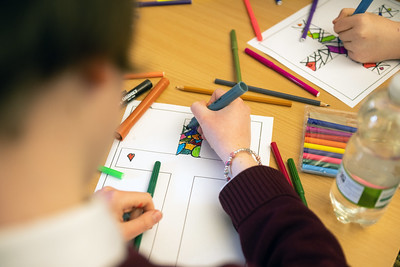 Catholic schools take in 50% more pupils from the most deprived backgrounds than the state sector, according to the latest data.
Catholic schools take in 50% more pupils from the most deprived backgrounds than the state sector, according to the latest data.
Just under a fifth of all pupils in Catholic statutory education meet the highest national deprivation criteria, compared to a 12.8% England average. Similarly, a quarter fewer pupils from the more affluent areas attend Catholic schools.
Free school meals are available for parents on benefits, but continue after household income rises above eligibility criteria.
The number of Catholic school pupils on free school meals is marginally lower than the national average, as many parents are ineligible due to immigration status or low-paid employment, with barriers to take-up including the complexity of applications and financial privacy concerns.
Pupils from ethnic minorities make up 45.5% of the Catholic school population, compared to an England state school average of 37.4% — for Wales the Catholic figure is 35.6%, and the Welsh average 14.3%.
There are 2,169 Catholic schools in England and Wales, educating more than 850,000 pupils, making up 9% of the state-funded sector. The Catholic Church is the biggest provider of secondary education and the second-largest provider of primary education overall. There are also four Catholic universities in England.
The figures come from the annual census of Catholic schools and academies conducted by the Catholic Education Service (CES), which acts on behalf of the Catholic Bishops' Conference and has supported Catholic education since 1847.
Paul Barber, CES Director, said: “Many Catholic schools were established to help poor immigrant families during the nineteenth century, and this tradition of providing education for those most in need has continued ever since.
“Today Catholic education outperforms national GCSE averages for English, Maths and Religious Education by up to seven percentage points, a testament to the sector’s success given the much higher proportion of pupils coming from the most deprived households in the country.”
A total of 56.4% of pupils in Catholic schools are of the faith, as are 43% of the 51,650 staff employed. Of the 334,273 non-Catholic pupils, just under half are from other Christian denominations. The largest non-Christian religion represented is Islam, with 10.8% of non-Catholic pupils being Muslim.
Only 0.04% of pupils are withdrawn from acts of collective worship such as Mass and prayers in assemblies.
Catholic schools continue to convert into becoming Catholic academies, with a 13% increase in the past year. There are now 921 Catholic academies in England, run by 79 multi-academy trusts, with 46% of Catholic state-funded schools being academies.
Read the reports on schools, colleges and academies for England and for Wales.
Image by Mazur/CBCEW
Winners announced in Columban competition for Catholic schools
Winners have been announced in a media competition for young people on the subject ‘Biodiversity Matters,’ run by the Columban Missionary Society in Britain and Ireland. The announcement day - 21 March - is the UN’s International Day of Forests.
Young people 13-18 years were asked to produce a piece of writing or image that demonstrates an awareness and understanding of the issue of biodiversity and highlight people, communities and/or organisations trying to build a sustainable future. Protecting biodiversity - which humanity relies on for health, food and well-being - is a mission priority of the Columbans.
The competition attracted 223 entries across Britain and Ireland.
In Britain, entries from 29 schools were judged by media experts who praised the high quality of all the entries shortlisted: Ruth Gledhill (Assistant Editor at The Tablet), Josephine Siedlecka (Founder and Editor of Independent Catholic News - ICN), Jao Resari (Columban lay missionary in Taiwan and an artist), and James Trewby (Columban Education Worker). Mary Colwell, author and champion for curlew recovery and nature education provided expertise on the theme. “We were very happy with the quality of entries and I was amazed at their energy and thoughtfulness,” said James Trewby, Columban Education Worker in Britain.
The winning article came from Austin Beenham of Holy Cross Catholic High School in Chorley, Lancashire. It was described by Ruth Gledhill of The Tablet as “an outstanding piece which incorporates calls to action, strong arguments and personal experience along with knowledge and accurate citation of Catholic Social Thought.” Austin himself said, “I am very thankful that I have been able to raise awareness on the biodiversity crisis and hopefully made a difference.”
Second and third were Anna Cookson of Notre Dame Sixth Form College in Leeds and Sarah Ashcroft of Loreto Grammer School in Altrincham. Justine Barlow, Principal of Notre Dame College said, “it is fantastic news; what an achievement for Anna to come second in this important competition.”
Becki Bradbury of the RE Department at Loreto, one of many RE teachers who promoted the competition, congratulated Sarah and said, “we feel that the competition has allowed our students to fully consider the issue of biodiversity within our world and engage with Pope Francis' Laudato Si' letter which serves as a reminder to all of us how important care for our common home is.”
With her winning image (pictured, below), Chidera Anyakora, also from the Loreto School in Altrincham, said, “In this piece I wanted to present a diverse range of wildlife that mirrors the diverse and unique nature of our world as biodiversity can come in different forms.” Judge Mary Colwell said: “I really liked the imaginative approach and the message. By using the image of a heart wrapped in nature, it made the point that saving the natural world is as much about the heart as about rational thinking and science. That is the message of Laudato Si, too. And I like the variety of creatures used.” Josephine Siedlecka of Independent Catholic News felt the image showed “love of the world.”

Second in the images category (pictured, below) was an entry from Megan-Rose Ibus, of Loreto College, in St Albans.

The third winning image (pictured below) was by Charlotte Moyes of St Edward’s in Poole. Megan commented that, “beauty lies in diversity”. Charlotte said that in her hourglass drawing, “I wanted to show how time was ticking and that we urgently need to make a change and raise awareness about the impact we are having on biodiversity and that we should all play our part to protect our planet for future generations.”

The Columbans thanked all the young people who entered the 2024 competition and the judging panel. Former Columban competitions have focused on Climate Change, Migration, Throwaway Culture, Racism, 21st Century Changemakers and Peace.
Catholic over-representation among trainee teachers - data
Catholic schools are producing disproportionately more trainee teachers, due in part to recruiting their own pupils — and parents.
Three Catholic secondaries in Surrey have supplied 13 out of 80, or 16%, of student teachers at a major training provider for the South East thanks to a drive for recruiting among current and former pupils and parents. Catholic schools represent 9% of state-funded education in England.
Xavier Catholic Education Trust, made up of those three secondary schools as well as 12 primaries in the county, also encompasses Xavier Teaching School Hub and Xavier Teach SouthEast, an Ofsted outstanding-rated initial teacher training (ITT) provider serving the region.
James Kibble is Chief Executive Officer of Xavier Catholic Education Trust, and former Headteacher of Salesian School, a mixed Catholic comprehensive for 1,800 pupils aged 11-18, in Chertsey, in the Diocese of Arundel and Brighton. He said that Salesian School has historically looked to within for new trainee teachers, including even recruiting three parents of former students for the current intake.
“We’ve always had it - I don’t really know how schools survive if they’re not looking to the long term.
“It started with the sixth form, offering opportunities to try out being a teaching assistant in a secondary or a local primary,” he said. “We talk to the students about their career programme, about locations, and involve specialists in teaching up to when they leave.
“We try to be as creative as possible. When there have been real shortages, we look at subject lists of pupils for those with potential and give them experience. If they’re good enough they’re taken on as unqualified graduate teachers to be trained through the year. Some former pupils are assistant headteachers now, it can make you feel old!
“It’s through keeping in touch — we stay in contact, but it’s really in the second year of university that they’re asked to think about it. We get them on an internship for four weeks in the summer term, and interview them before they leave for their third year of university, then have them back as a graduate teaching assistant while they’re deciding. They might then enter the programme, though some go straight into Initial Teacher Training.”

Case study: Ellie O’Connor (pictured) is a former Salesian School pupil undertaking a teacher training course with Xavier Teach SouthEast.
She described her time at the school as being very much part of a community, which proved its worth during the pandemic when her graphic design course at university went entirely online and she wanted some practical experience. Her old art teacher suggested applying for an art technician vacancy at Salesian.
Ellie said: “Once I started working there I really enjoyed helping students unlock their creative potential and come up with new ideas, as well as sharing my subject knowledge on different artists and techniques.
“Coming back to this community and being able to be a part of the teaching side and getting to work alongside so many inspiring teachers that helped me through my GCSEs, A-Levels and young adult life was really what pushed me to go on and do my SCITT training with Teach South East — I wanted to make a difference to someone else's life, like my teachers had made to mine.
“Now I am an art teacher in my first year as an ECT and my head of department taught me all the way from Year 7 to 13, so to be able to work closely alongside someone my parents trusted with my education has been amazing.
“I would encourage anyone to get into teaching, it's such a rewarding job and I feel so lucky that I get to teach at my old school.”
Ultimately, for Xavier it’s a matter of long-term forward planning and collaboration between academy trusts, schools and parishes for this Catholic approach to new teacher recruitment.
James said: “It’s obviously a long game, of at least four or five years. Particularly if you want people who understand your Catholic ethos, who better than the pupils who’ve been steeped in it throughout their education?
“Before it was more about encouragement, but now we have a huge emphasis, we had to be a lot more structured about it and it’s grown and grown.”
New guidance for schools to support children with a parent in prison
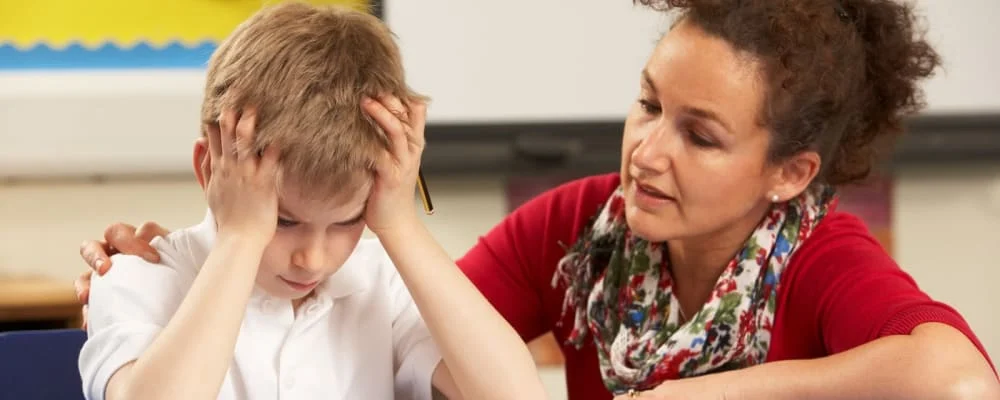 Children in England with a parent in prison have access to more support with a new, dedicated resource pack for schools and educational settings.
Children in England with a parent in prison have access to more support with a new, dedicated resource pack for schools and educational settings.
The new toolkit provides advice and support for teachers who have children in their classes with a parent in prison. It seeks to foster understanding about the issue in schools and to ensure that young people affected by imprisonment know that there is help available for them. The toolkit has been produced by national Catholic charity Pact, the Prison Advice and Care Trust.
With the prison population across England & Wales near a record high, so too is the number of children being affected by the imprisonment of a parent. It’s estimated that around 100,000 children have a father or mother behind bars right now and research estimates that around 1 in 15 children (7%) will experience a parent’s imprisonment at some point during their time at school.
Many children with a parent in prison go on to lead positive and fulfilling lives. However, a range of research shows that they are more likely to suffer from problems later in life, including mental health problems, homelessness and poverty.
The new toolkit provides teachers with a range of resources to support children affected by imprisonment. It seeks to give teachers the confidence to create a space for the whole class to discuss the issue and allows fellow students to empathise with children who are affected and find ways to support them.
Aimee Hutchinson, Children and Young People Lead at Pact, said:“The imprisonment of a father or mother can have a devastating impact on children and young people. With the right support, children with a parent in prison will go on to lead happy and fulfilling lives. However, it’s a sad fact that they face more challenges than many other children and that there remains a real stigma around having a family member in prison.
“We hope this new guidance will support teachers to have an open and constructive discussion about these issues that affect many thousands of children and young people every year.”
The Church needs you! A school chaplain on why you should consider becoming one
 Harry Rawcliffe is school chaplain at The Campion School, Hornchurch, in Brentwood Diocese.
Harry Rawcliffe is school chaplain at The Campion School, Hornchurch, in Brentwood Diocese.
‘Sir, what do you do?’, a Year 8 student asked me as I stood on the playground in the first month of my new job. I had to pause and consider the question – not just because I had not yet had my morning coffee!
I offered something boiler-plate along the lines of ‘I help the school to live out our faith.’ True, I suppose. Yet insufficient!
In my two years here I have only become more convinced of the vital role of a dedicated chaplain in Catholic secondary schools. No job description can quite capture the role. You are a source of pastoral support and counsel for staff and students. You are a networker and catalyst for energy and initiatives already present in the school and the wider community – charity initiatives, social justice projects, wellbeing and spiritual development opportunities. You walk with individuals up the mountain of God – leading them to, and facilitating, moments of encounter in the Sacraments or on retreat.
But more fundamentally, a school chaplain is themselves. You bring your own joy, style and personal touch to the role. For some, this means using musical or artistic gifts and talents. For others, it means helping out in PE and with sports teams. For me, it is neither of those examples! Whatever it is, a school chaplain brings themself to the role, as they are. Young people can smell ‘inauthenticity’ from a mile away. When they are accompanied by people who are simply being themselves, young people feel able to be themselves too.
I find my own prayer life to be the one thing that can give me the grace I need to do my job well – because in prayer we remember who God is, and who we truly are.
What are some essential skills to be a school chaplain? Know that you are loved by God and that you are a pilgrim on the journey of life. Be the sort of person who finds joy and life in building relationships with those you are walking with on the pilgrim way (see also: The Road to Emmaus). Have a heart for sharing the love of God you have come to know. Be able to laugh at yourself and don’t be afraid to make a fool of yourself – sadly no photographic evidence exists of me on ‘sponge a teacher’ day, but many of our students can attest that I took my fair share of blows!
The school chaplain is a joyful witness of the resurrection in their community. There is a dearth of hope in the present young generation, which we need to have an answer for (we do, and his name is Jesus!) This doesn’t necessarily mean you spend every moment in school talking about Jesus. There are plenty of opportunities for that, such as assemblies and liturgies, but there is also a lot of time simply journeying through the ups and downs of everyday life. As a wise Jesuit priest and former Headteacher once advised me, ‘Spend time with them talking about the things that don’t matter. Then they will come to you to talk about the things that do matter.’
Being a school chaplain has been the greatest joy and privilege of my life so far. So much of the role is discreet, gentle, personal and – to use one of Pope Francis’ favourite words – tender. That might not be captured easily in productivity targets or exam data. But it resonates with Elijah’s encounter with God, in the gentle breeze.
I would absolutely encourage anyone who thinks they might have a heart for school chaplaincy to explore it, perhaps by finding time to shadow a chaplain already in post. The Church needs you!
To find out more about becoming a school chaplain, please contact your diocese.
Harry Rawcliffe is on the far left in the picture above, taken during events to mark World Youth Day, in Portugal, 2023.
Statement on inaccurate Sutton Trust 'Selective Comprehensives' research
Paul Barber, Catholic Education Service Director, said: “Catholic schools take in 50% more pupils from the most deprived backgrounds than the state sector.
“Just under a fifth of all pupils in Catholic statutory education meet the highest Income Deprivation Affecting Children Index (IDACI) criteria, compared to a 12.8% England average. Similarly, fewer pupils from the more affluent areas attend Catholic schools.
“Catholic schools have ten times the catchment area of other schools, and so are less reflective of their immediate locality.
“Free school meals are available for parents on benefits, but continue after household income rises above eligibility criteria. The number of Catholic school pupils on free school meals is marginally lower than the national average as many parents are ineligible due to immigration status or low-paid employment, with barriers to take-up including the complexity of applications and financial privacy concerns.”
Bishop Marcus' Advent message to Catholic schools
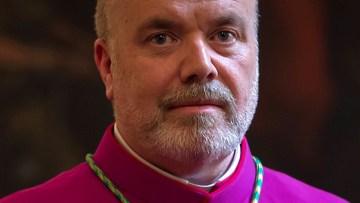 Dear Brothers and Sisters in Christ,
Dear Brothers and Sisters in Christ,
In this liturgical season of Advent, we encounter refrains of preparation and expectation. These are experienced in the daily and Sunday readings; they culminate at Christmas in celebration of the birth of Our Lord and Saviour Jesus Christ, and the renewal of the calendar year with the Solemnity of Mary the Holy Mother of God.
Soon the school term will also give way to the holiday period. To school leaders, teachers, learning assistants, chaplains all those employed in our diocesan schools and colleges, I offer my thanks for their dedicated work and for their vocation within Catholic education.
Every year yields new challenges and those who exercise governance give so generously of their time, experience, and expertise. I wish to express my thanks therefore also to school and university governors and to trust boards, for their stewardship of the Church’s school, college and university communities and their important role in Catholic education.
Of course, parents are the first teachers of their children. The school environment in which children are taught and can flourish is founded upon all that they learn first in the family home. The parental love and encouragement which children receive in their home is reflected in the continued success of Catholic education at all levels, and for this grace we give thanks to the Lord.
May Almighty God bless you, your families and loved ones through these joyous days of Advent and Christmas and keep you safe throughout the Year of Our Lord 2024.
With the assurance of my prayers for you all, I remain,
Your servant in our Lord Jesus Christ.
Rt Rev Marcus Stock
Chair of the Catholic Education Service
Bishop of Leeds
Trustees needed for Centre for Chaplaincy in Education
 Are you committed to supporting and developing chaplaincy in education and called to give your time, experience and skill to the role of a trustee?
Are you committed to supporting and developing chaplaincy in education and called to give your time, experience and skill to the role of a trustee?
The Centre For Chaplaincy In Education is seeking new trustees.
You might be a serving or retired chaplain or church or school leader, or you may be approaching this from another perspective.
Whatever your background and interest, the CCE would be pleased to hear from you.
As well as a general trustee roles, we are also looking for someone who can take on responsibility for finance.
For an informal conversation please contact Mike Haslam, Chair of Trustees, at This email address is being protected from spambots. You need JavaScript enabled to view it.
Listen up: Catholic university hosts education podcast
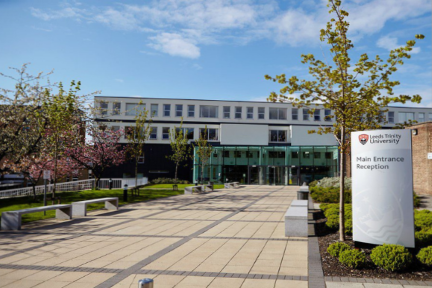 A podcast on how to return Church thought to public debate is now available, with episodes featuring contributions from a former government minister, Catholic university leaders and internationally distinguished academics.
A podcast on how to return Church thought to public debate is now available, with episodes featuring contributions from a former government minister, Catholic university leaders and internationally distinguished academics.
Beyond The Dark Clouds is hosted by Leeds Trinity University, one of four Catholic universities in England, and is centred around justice in contested issues such as law enforcement, economics, spirituality, the arts and more.
Episodes include former Labour government Trade and Industry, and Foreign and Commonwealth Affairs minister, Sir John Battle discussing the relevance of a Catholic university in the secular world. Leadership and the future of Catholic higher education is considered by Professor Anthony McClaran, Vice-Chancellor St Mary’s University.
Professor Nicolas Vergier of the Institut Catholique de Paris and International Federation of Catholic Universities addresses the purpose of Catholic universities. Justice in policing is the theme undertaken by Professor Tobias Winright of St Patrick's Pontifical University, in Maynooth, Ireland.
Dr Ann Marie Mealey, Director of Catholic Mission at Leeds Trinity, speaks about the relevance of Catholic Social Teaching for debate in the public square and higher education sector. She explains that education for hope is the key theme for the series, in seeking to demonstrate how Catholic education and Catholic intellectual tradition can offer hope to a fractured world.
Other subjects for discussion include universities renewing a sense of purpose in students; faith and conversion in the works of Virginia Woolf; spirituality and art, as well as the need for a new narrative of faith in society.
An excellent lecture on spiritual friendship in relation to the Synod, given by internationally respected scholar and author on Christian education, Professor John Sullivan, can help listeners to consider the route to dialogue in a period of listening in the Church.
Pope Francis in his 2020 encyclical Fratelli Tutti (on fraternity and social friendship) refers to ‘dark clouds over a closed world’, which inspired the podcast’s title.
Beyond The Dark Clouds is hosted and produced by Dr Ann Marie Mealey, with help from the university’s Senior Lecturer in Journalism, Darren Harper.
Listen to Beyond The Dark Clouds on Spotify and other platforms.

